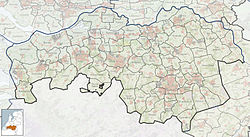Vierlingsbeek
Vierlingsbeek | |
|---|---|
Village | |
 Water mill | |
| Coordinates: 51°35′46″N 6°0′37″E / 51.59611°N 6.01028°E | |
| Country | Netherlands |
| Province | North Brabant |
| Municipality | Land van Cuijk |
| Area | |
| • Total | 17.38 km2 (6.71 sq mi) |
| Elevation | 15 m (49 ft) |
| Population (2021)[1] | |
| • Total | 2,645 |
| • Density | 150/km2 (390/sq mi) |
| Time zone | UTC+1 (CET) |
| • Summer (DST) | UTC+2 (CEST) |
| Postal code | 5821[1] |
| Dialing code | 0478 |
Vierlingsbeek (Dutch pronunciation: [ˌviːrlɪŋzˈbeːk]) is a village in the former municipality of Boxmeer in North Brabant province of the Netherlands. Until it was included in Boxmeer in 1998, it was a municipality of its own.[3] Since 2022 it has been part of the new municipality of Land van Cuijk.
The UN/LOCODE is NLVIE.
History
[edit]Vierlingsbeek developed in the Early Middle Ages on the river bank of the Maas. In 1756, the village was damaged by a large fire, and it developed along the Venraij to Boxmeer road.[4]
The Dutch Reformed church was built in 1843 after its predecessor from 1804 had partially collapsed in 1839. The clergy house is the former hunting cabin of William I of the Netherlands.[4] The church was decommissioned in 1997, and is used for weddings, concerts and cultural activities.[5] The Catholic St. Laurentius Church was built between 1952 and 1953 after its 1804 predecessor had been destroyed in 1944.[4]
Vierlingsbeek was home to 806 people in 1840.[5] In 1883, a railway station opened on Nijmegen to Venlo railway line. The original building was destroyed in 1945.[6] The village was heavily damaged in 1944.[4]
Vierlingsbeek was an independent municipality until 1998 when it was merged into Boxmeer. In 2022, it became part of the Land van Cuijk.[5]
Gallery
[edit]-
Church: Sint-Laurentiuskerk
-
Villa in Vierlingsbeek
-
Railway station
-
Ferry
References
[edit]- ^ a b c "Kerncijfers wijken en buurten 2021". Central Bureau of Statistics. Retrieved 17 April 2022.
two entries
- ^ "Postcodetool for 5821AA". Actueel Hoogtebestand Nederland (in Dutch). Het Waterschapshuis. Retrieved 17 April 2022.
- ^ Ad van der Meer and Onno Boonstra, Repertorium van Nederlandse gemeenten, KNAW, 2011.
- ^ a b c d Chris Kolman & Ronald Stenvert (1997). Vierlingsbeek (in Dutch). Zwolle: Waanders. ISBN 90 400 9945 6. Retrieved 17 April 2022.
- ^ a b c "Vierlingsbeek". Plaatsengids (in Dutch). Retrieved 17 April 2022.
- ^ "station Vierlingsbeek". Stationsweb (in Dutch). Retrieved 17 April 2022.







